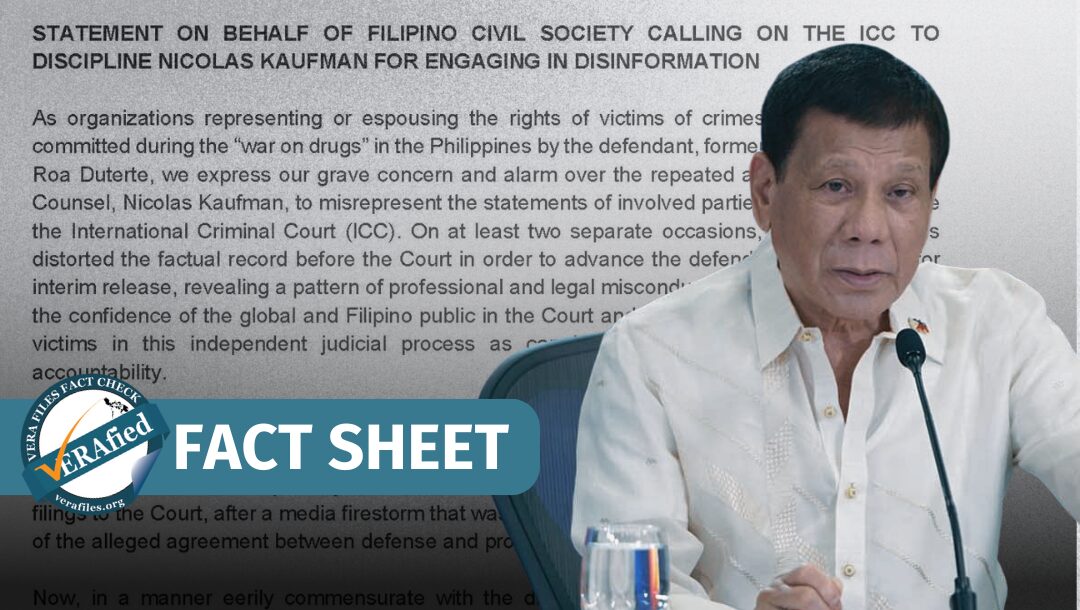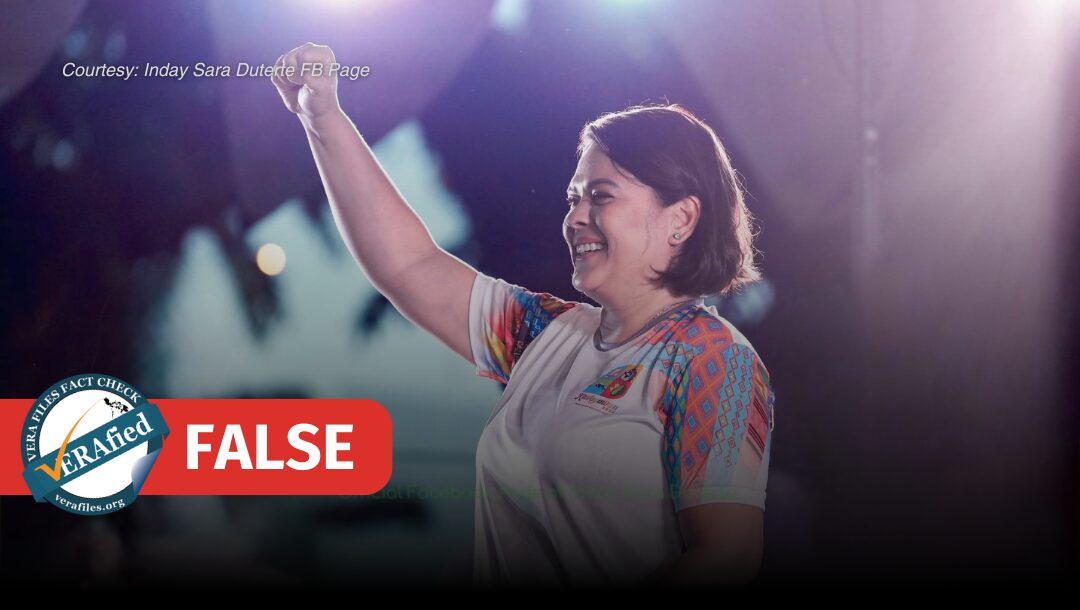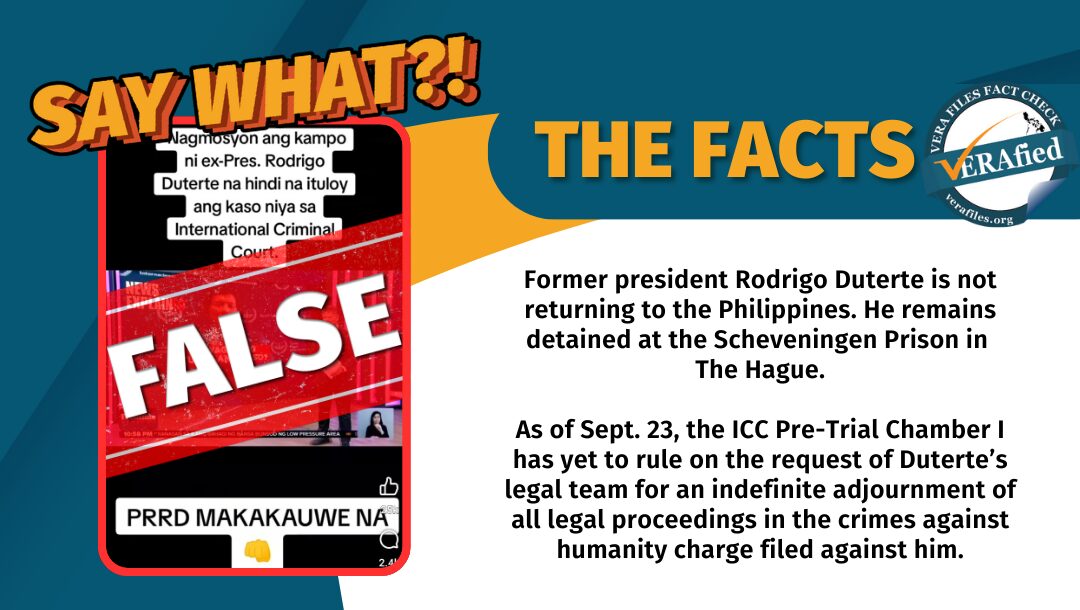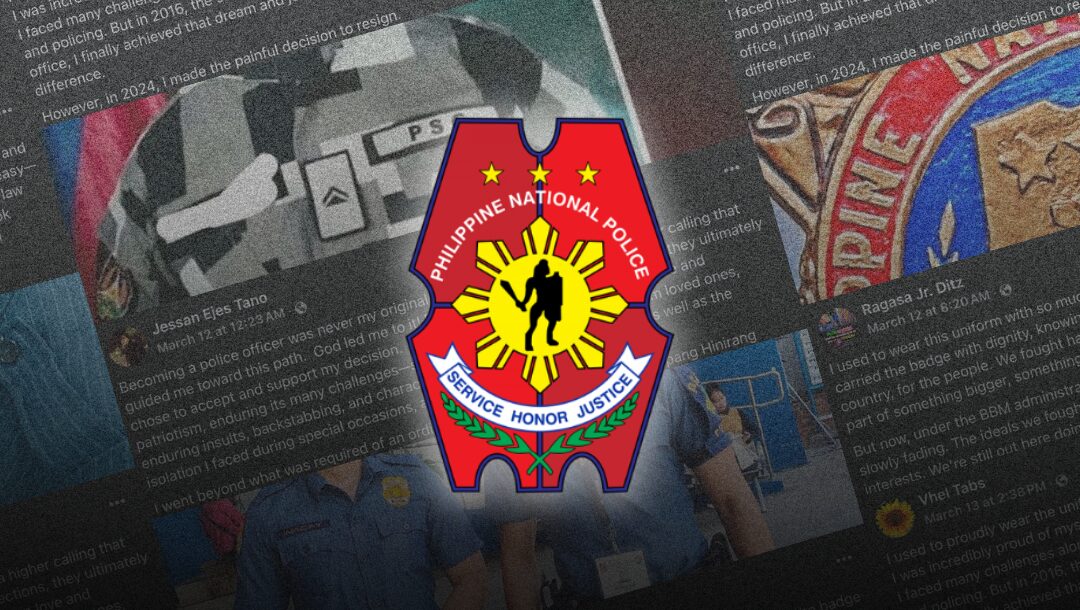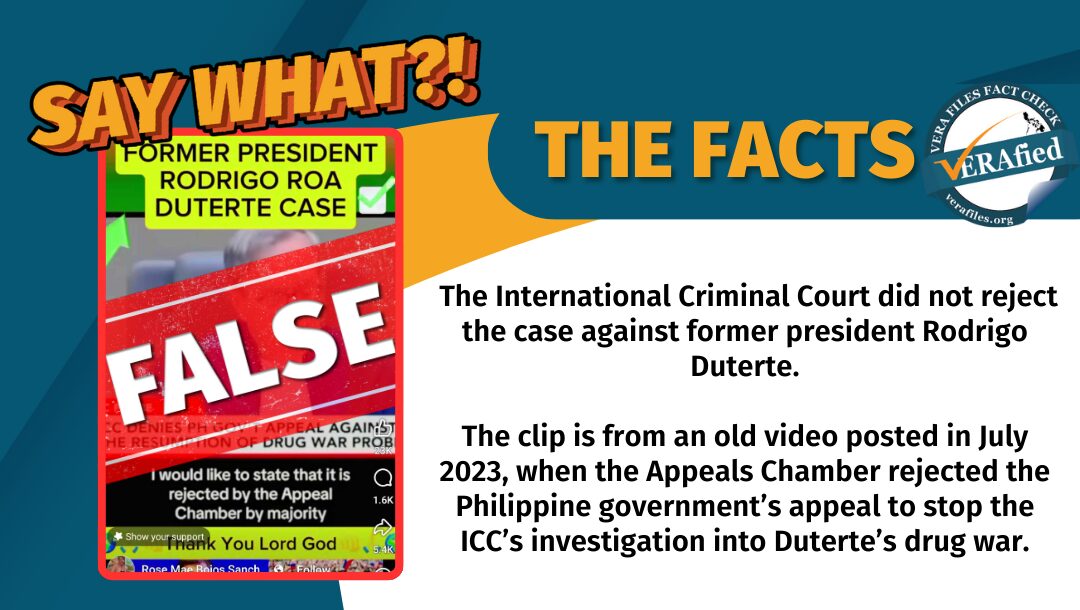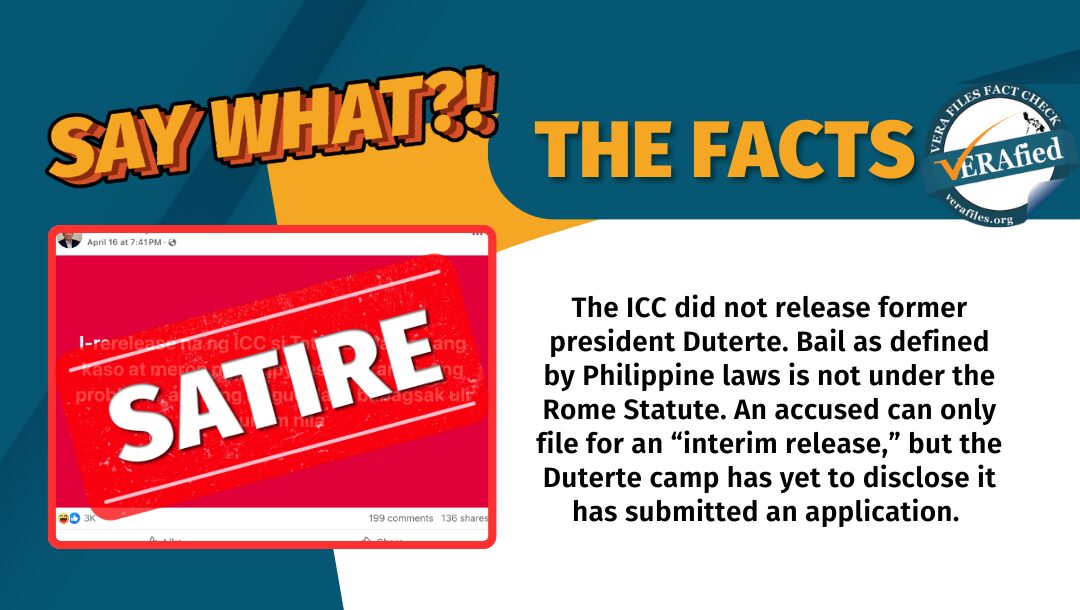Fifty-four civil society groups and individuals, including lawmakers, asked the International Criminal Court on Sept. 28 to discipline Nicholas Kaufman, chief lawyer of former president Rodrigo Duterte in The Hague-based international tribunal, for allegedly distorting facts in order to convince the court to grant his plea for interim release of his client.
“On at least two separate occasions, Mr. Kaufman has distorted the factual record before the Court in order to advance the defendant’s application for interim release, revealing a pattern of professional and legal misconduct that directly undermines the confidence of the global and Filipino public in the Court and dangerously erodes the trust of victims in this independent judicial process as capable of delivering of truth-telling and accountability,” said a three-page call on the ICC to discipline Kaufman for “engaging in disinformation.”
A copy of the appeal obtained by VERA Files from CenterLaw Philippines condemned Kaufman for “misrepresent[ing] the statements of involved parties.” It cited Kaufman’s inaccurate claim in a June 12 filing that the Office of the Prosecutor had agreed to the interim release of Duterte under certain terms, which the OTP had “explicitly denied.”
In another filing released on Sept. 26, Kaufman “mischaracterized” the statement of Presidential Press Undersecretary Claire Castro and “twisted its meaning and implications” by asserting that the Philippine government does not oppose the defense’s request for interim release, it said further.
On Sept. 8, the court’s Pre-Trial Chamber 1 postponed the Sept. 23 confirmation of charges hearing for Duterte on Kaufman’s request, which included a motion for indefinite adjournment. The defense’s filing dated Aug. 18 (made public on Sept. 11) claimed the 80-year-old Duterte is “not fit to stand trial as a result of cognitive impairment in multiple domains.”
While the PTC 1 did not proceed with the Sept. 23 hearing, it allowed a “limited postponement” to give them time to examine Kaufman’s claim.
The former president is accused of being criminally responsible for dozens of murders that took place during his administration’s brutal war on drugs when thousands of small-time drug dealers, users and others were killed without trial. The Document Containing the Charges or DCC filed on July 4 (released publicly on Sept. 22) lists the charges.
Following the postponement of the confirmation of charges hearing and the pending request for disciplinary actions against Kaufman, how will the PTC 1 proceedings move forward? What possible scenarios can we expect ahead? Here are a few things you should know:
1. What happens now that the ICC has postponed a crucial hearing on the confirmation of charges against Duterte?
In a Sept. 9 press conference, Kristina Conti, assistant to counsel for the ICC, said the tribunal has no official guidelines on the duration of a limited postponement. She said, however, that as a “generic rule,” the PTC 1 has 120 days to decide on the claim of Duterte’s lawyers. She hopes for a decision before the ICC’s “vacation period” in December.
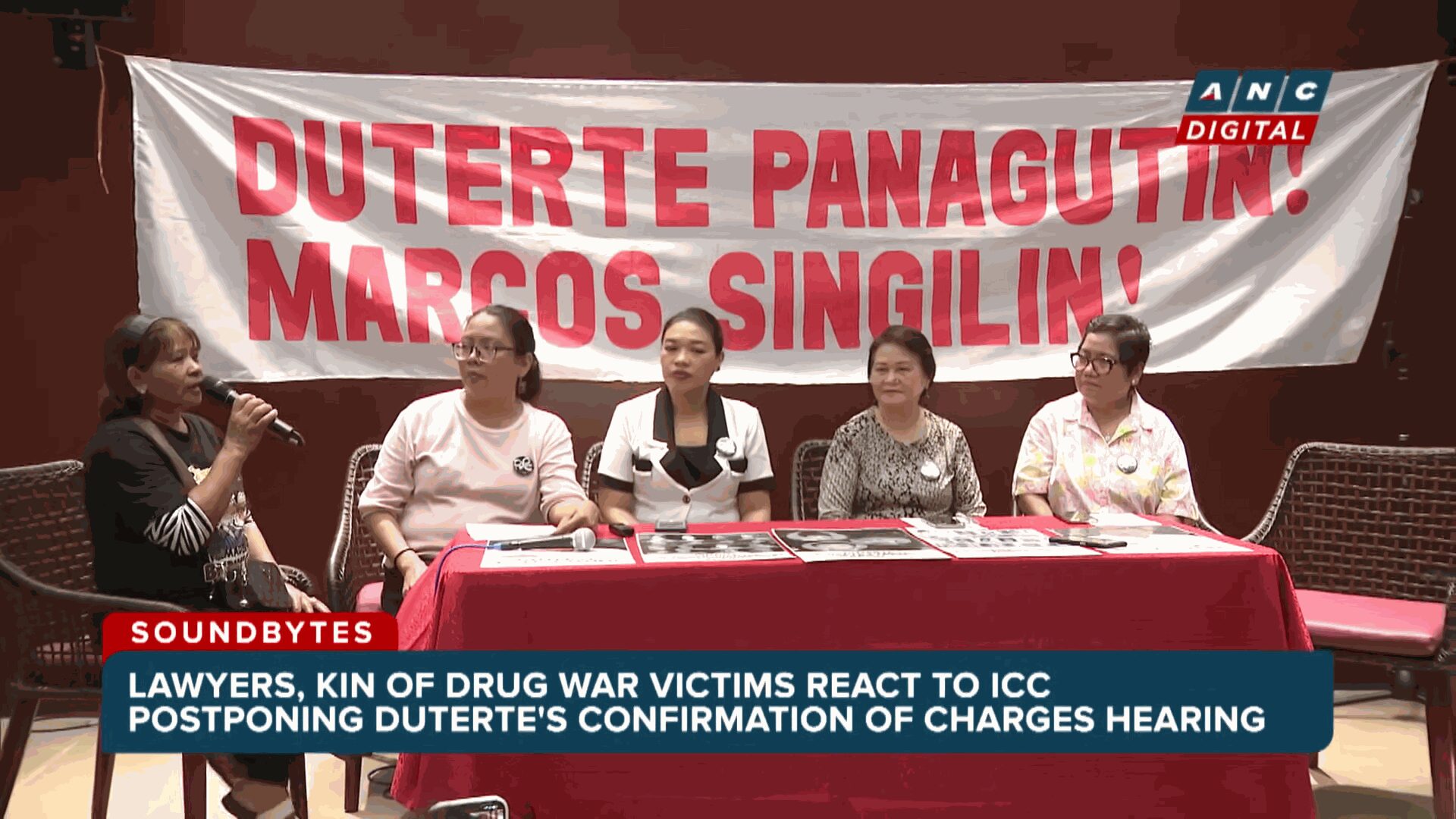
To be considered fit for trial, Conti said Duterte should be able to listen and follow the proceedings, and answer and defend negative accusations against him. The ICC would review “both physical and psychological situations,” she said.
As a hypothetical scenario: if the PTC 1 were to find Duterte unable to stand trial, lawyer Dino de Leon, an alumnus of The Hague International Law, said in a Facts First podcast interview with journalist Christian Esguerra that the case could still proceed, considering that Duterte has co-perpetrators or chief implementers, who were a “fundamental part” of the charges against him.
The names of Duterte’s co-perpetrators were redacted in the published DCC, giving only hints by mentioning the agencies they belonged to. These include law enforcement officers from the Philippine National Police, the Philippine Drug Enforcement Agency, the National Bureau of Investigation, and the Bureau of Corrections.
Conti, however, believes Sen. Ronald “Bato” Dela Rosa, PNP chief during Duterte’s term, is one of the key co-perpetrators mentioned in the July 18 Pre-Confirmation Brief of PTC 1, for having been the chief implementer of the drug war.
“Binabanggit nga doon sa Pre-Confirmation Brief ang naging masusing role ni Bato Dela Rosa [sa drug war],” Conti said. “At para sa akin, malinaw na inilalatag [ng Brief] na si Bato Dela Rosa ay co-perpetrator kasama ni Duterte,” Conti said in a Sept. 24 interview on ANC 24/7.
(The Pre-Confirmation Brief is indicating the key role Bato Dela Rosa played in the drug war. And for me, the brief makes it clear that Bato Dela Rosa is a co-perpetrator alongside Duterte.)
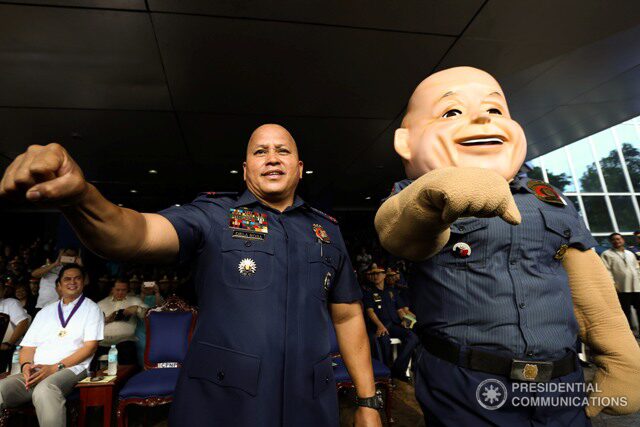
The brief took note of Dela Rosa’s statements following his appointment as PNP chief in 2016, telling reporters: “Killings in the name of drugs. This is really about killings in the name of drugs. So you drug lords out there, get ready because I’ll crush you.”
Aside from Dela Rosa, former Justice secretary Vitaliano Aguirre II was also mentioned in the brief for having said the Duterte administration would “do everything to stop drugs, crimes, and corruption” and “will choose to kill these drug lords.”
However, ICC-accredited lawyer Gilbert Andres said an application for an arrest warrant will be required if this were to happen, saying that it will be a separate process that will prompt the prosecutor to undergo an “ex parte hearing,” or a one-sided discussion with a judge, and PTC 1 would have to approve the warrant application.
This possible shift in the case was also a reason for the late publication of the DCC. Andres said the redacted version of the DCC was released publicly two months after its filing because the information, such as names, involved “security” and “delicate” details, had to be censored (for now), to avoid, for instance, Duterte’s co-perpretrators from hiding or running away.
2. What are the implications of the DCC? What would happen if the PTC 1 rejects the claim of Duterte’s lawyers?
Interviewed on One PH’s television program Morning Matters on Sept. 23, Andres said the DCC is the official list of the charges against Duterte. This will be subject to confirmation by the PTC 1 through the confirmation of charges hearing.
According to Article 61(7) of the Rome Statute, each of the three counts of murder constituting crimes against humanity will be evaluated during the hearing to determine if these are supported by sufficient evidence to believe that the defendant committed them.
PTC 1 has three options in evaluating each of the charges. See the infographic below:
According to the ICC process video, if one or more of the charges against Duterte are confirmed during the hearing, the case will proceed to trial to be conducted by another chamber consisting of three trial judges.
At this stage, Duterte will transition from being a defendant to an accused. The ICC considers everyone innocent until proven guilty beyond reasonable doubt, as prescribed in Article 66 of the Statute.
On the first day of the trial proper, Duterte can plead guilty or innocent of the crimes charged. At this stage, the prosecution will present its evidence and the defense, its counter-evidence for the accusations. The victims, through their lawyers, can speak up, and witnesses from both sides can provide their perspectives. The ICC could issue protective measures for the witnesses.
If the prosecutor fails to convince the Trial Chamber that Duterte is guilty, he would be acquitted. However, if the prosecutor can provide sufficient evidence proving guilt beyond reasonable doubt, the Trial Chamber would proclaim the sentence: imprisonment or other penalties prescribed in Article 77, such as fines and forfeiture of properties and other assets.
The prosecutor or the defense can appeal the sentence, whether guilty or acquitted, to the Appeals Chamber, which would “decide whether to confirm, amend or reverse the Trial Chamber’s decision.”
If convicted, Duterte would serve his sentences in any of ICC’s member countries. The Philippines ceased being a state party to the ICC in March 2019 when its withdrawal of membership to the Rome Statute took effect.
When the case is decided, victims will be provided reparations, such as “monetary compensation, rehabilitation and medical support,” which the guilty person or persons must pay. If reparations become unbearable, the Trust Fund for Victims would be used “to support and implement programs that address harms resulting from” the main crimes.
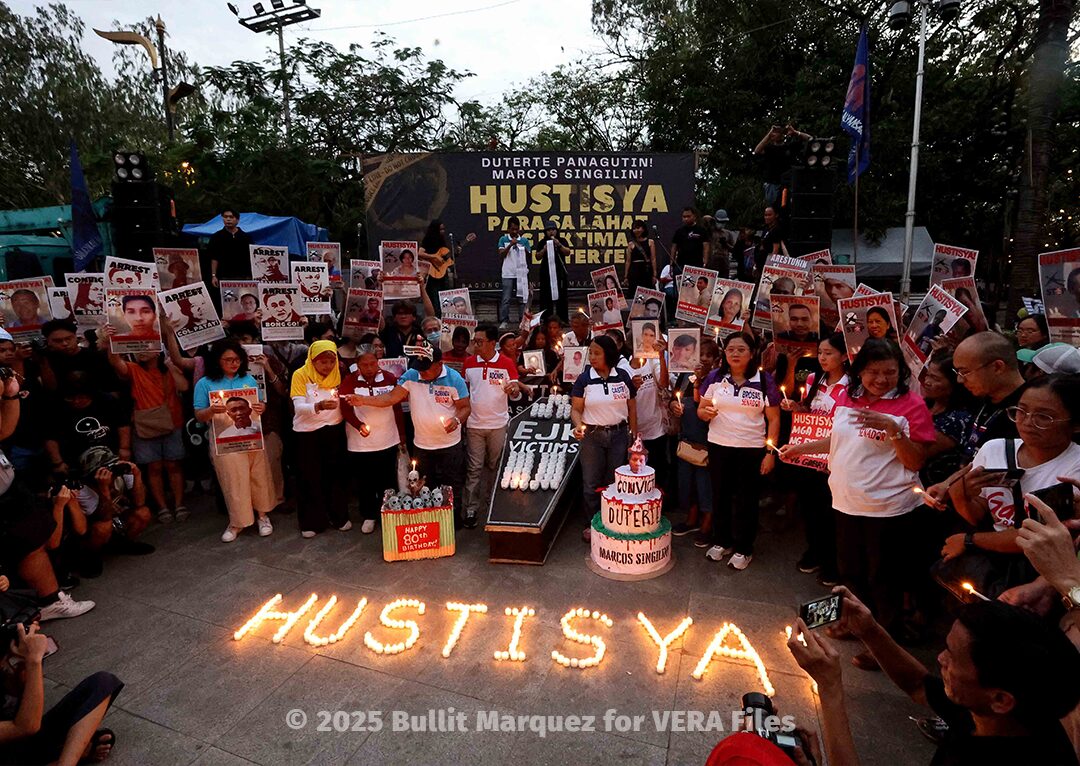
At present, Andres said, the counsels’ “next steps” for the victims will be to explain the implications and effects of the DCC, as well as to get their views and concerns on the document and postponement of the Sept. 23 confirmation of charges hearing, which they hope to raise to the PTC 1.
3. What are the charges, counts, and incidents against Duterte?
The Rome Statute, the international treaty that established the ICC, listed four “gravest crimes of concern to the international community” falling under the court’s jurisdiction, namely:
- Genocide – where there is a “specific intent to destroy in whole or in part a national, ethnic, racial or religious group by killing its members or by other means.”
- Crimes against humanity – actions “as part of a widespread or systematic attack directed against any civilian population, with knowledge of the attack.”
- War crimes – “grave” violation/s of the Geneva conventions during armed conflict.
- Crime of aggression – defined as “the use of armed force by a state against the sovereignty, integrity or independence of another state.”
In the DCC, Duterte was charged with crimes against humanity, which was categorized into three separate but related counts of murder involving 49 incidents, criminal offenses and concrete events that establish a count.
The PTC I, the court handling the initial proceedings, summarized the three counts of crimes against humanity as follows:
Count 1: Murder of 19 people in Davao City between 2013 and 2016 while Duterte was mayor.
Count 2: Murder of 14 “high-value targets” across the country during his presidency.
Count 3: Murder and attempted murder of 45 people in barangay clearance operations across the country, also while he was president.
Editor’s note: This fact sheet was produced with the help of a journalism student of the University of Santo Tomas as part of their internship at VERA Files.
